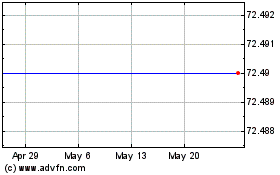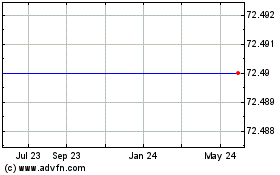Corporate Market Takes In Heavy Issuance, Yields At Record Low
February 28 2012 - 6:16PM
Dow Jones News
Investors turned the risk-switch firmly to the "on" position
Tuesday, helping corporate bonds continue to rally even after
yields hit record-lows on Monday.
Nineteen of the 20 most actively traded bonds strengthened
relative to Treasurys, according to MarketAxess. The list included
improvements of between 15 and 20 basis points on intermediate
bonds issued by Goldman Sachs Group (GS), Citigroup (C), and
AccelorMittal SA.
The CDX North America Investment-Grade Index, a measure of
health for the corporate bond market, was on track to finish at its
best closing level since July 26, according to Markit. The index
improved 1.8% as of late-afternoon trading, putting it at 93.7
basis points.
Riskier assets were rallying as investors anticipate a
successful second-round to the European Central Bank's Long-Term
Refinancing Operation, which takes place Wednesday. The operation
allows banks to post weak collateral in exchange for a three-year
loan at 1%. That works to flood the system with liquidity, pushing
yields down on bank bonds and sovereign debt, and reducing
counter-party risks in the global financial community.
Dan Hannis, corporate bond trader at William Blair & Co.,
said the market's optimism is evident as corporate bond spreads
tighten to multi-month lows and equities hit multi-year highs. But
he noted the 10-year Treasury isn't confirming the optimistic
sentiment: its yield has fallen to 1.93% from 2.06% a week ago.
"People are willing take risks in credits or equities, but they
are going to hedge that in case of a bad LTRO number, with Treasury
bonds," Hannis said.
What constitutes a bad LTRO number is open to debate. In the
first operation on Dec. 21, the ECB approved EUR489 billion in
loans.
If the figure is much smaller in this round, it could indicate
banks feel stigmatized by relying on the ECB; if the number is too
large, it could indicate banks are fearful about their ability to
access funding elsewhere, Hannis said. The market would be
comforted by seeing a Goldilocks-figure somewhere between EUR200
billion and EUR800 billion.
Five high-grade issuers were clever enough to float debt in the
primary market Tuesday, where investors are most comfortable
placing their bets thanks to the better liquidity. New-issues
typically offer investors some extra yield, too, called a
concession.
Ryan Newth, director of corporate syndicate at SunTrust Robinson
Humphrey, said companies exiting the blackout period after
releasing full-year earnings are taking advantage of heavy investor
demand while they can. "Funds inflows that are coming in have been
so massive," he said. "And trading volumes are still fairly low, so
the only place to deploy cash is in the new-issue space."
Tuesday's market was led by a $2 billion offering from Deutsche
Telekom International Finance. Its two-part private-placement
featured $1 billion of five-year notes yielding 1.53 percentage
points over Treasurys and $1 billion of 30-year bonds yielding 1.9
points over Treasurys.
Burlington Northern Santa Fe sold a $1.25 billion two-part deal
evenly split between 10-year notes that offered 1.15 percentage
points over Treasurys and 30-year bonds that offered 1.375 points
over Treasurys, while U.S. Bancorp (USB) sold $1 billion of 10-year
notes at 1.1 percentage points over the Treasury rate.
Among smaller deals, H.J. Heinz Co. (HNZ) sold $600 million in a
two-part deal evenly split between 1.5% coupon, five-year notes
priced to yield 1.532%, or 0.70 points over comparable Treasurys,
and 2.85% coupon, 10-year notes priced to yield 2.869%, or 0.95
points over Treasurys.
TransCanada Pipelines Ltd., the Calgary natural-gas pipelines
company, sold $500 million of three-year notes at 0.60 percentage
points over the Treasury rate.
The deals might help break a February record for issuance, but
it all depends on what extent companies take advantage of the leap
year's extra session on Wednesday. The market took in $5.25 billion
Tuesday, which places the month's tally at $90.9 billion on 163
issues, according to Dealogic. The month's record is 2009, when
$94.4 billion was sold.
Appetite for corporate bonds helped average yields fall four
basis points to a record-smashing 3.30% Monday, according to the
Barclays Capital investment-grade index, which goes back to 1973.
The prior record was broken twice the week before.
Bank bonds, which carry higher yields than industrial or utility
bonds, have improved 0.8 percentage points year-to-date and
finished Monday at a yield of 3.76%, the lowest since Aug. 10,
2011.
-By Patrick McGee, Dow Jones Newswires; 212-416-2382;
patrick.mcgee@dowjones.com
Heinz H J (NYSE:HNZ)
Historical Stock Chart
From Apr 2024 to May 2024

Heinz H J (NYSE:HNZ)
Historical Stock Chart
From May 2023 to May 2024
